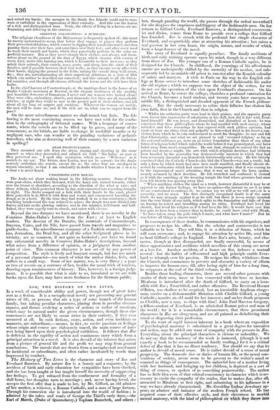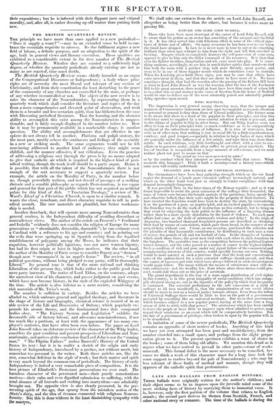ZOE, THE HISTORY OF TWO. LIVES,
IS a work of considerable ability and power, though not of great inte- rest as a fiction. It is a metaphysical novel ; not presenting any general views of life, or persons that are a type of some branch of the human family, but taking peculiar characters, placing them in peculiar eircrun- stances, and thence evolving a series of actions or rather of emotions, which may be natural under the given circumstances, though these cir- cumstances are not likely to occur twice in their entirety, if they ever occurred at all. In such fictions, story, action, and even incidents or manners, are subordinate,—means, in fact, to excite passions or feelings whose origin and course are elaborately traced, the main source of inte- rest being based upon their psychological exhibition. It follows that Zoe is deficient in the rapidity of action and continuous story which form a principal attraction in a novel. It is also devoid of the interest that arises from a picture of general life and the profit we may reap from general -conclusions. The morals that are drawn from a metaphysical novel must -be incidental or subordinate, and often rather inculcated by words than impressed by conduct.
The History of Two Lives is the character and story of Zoe anti 'Everhart] Burrows. By nature Zoe is a beauty and a coquette; by the accident of birth and early education her sympathies have been checked, and she has been taught or has taught herself the necessity of suppressing -her feelings. To get released from the confinement and formality of a -dull home, her thoughts turn to marriage ; and, never having loved, she accepts the first offer that is made to her, by Mr. Gifford, an old admirer af her mother, a widower, a Roman Catholic, and a man of large fortune. Through his connexion she is introduced into the world of fashion; is admired by the rakes and roués of George the Third's early days,—the Earl of March, (Duke of Queensberry,) TophaM BeauClerkl and othera
but, though puzzling the world, she passes through the ordeal unscathed for she despises the emptiness and frippery of the fashionable men. On her return to Gifford Castle, Everhard Burrows, a distinguished controvert-
1st and divine, comes from Rome to preside over a college that Gifford has founded. Zoe is struck with the profound but simple character of Everhard, and coquettishly aims at attracting his attention ; but raises a real passion in her own heart, the origin, nature, and results of which form a large featute of the novel.
The story of Everhard is equally peculiar. The family accidents of birth and early training operate upon his mind, though in a way different
from those of Zoe. The younger son of a Roman Catholic squire, he is designed for the Church. In childhood, the yearnings of his affectionate nature are undesignedly chilled by the austerity of his mother, and sub- sequently led by an amiable old priest to run riot after the Romish calendar of saints and martyrs. A visit to Paris on his way to the English col- lege at Rome serves to introduce some sketches of fashionable life under
the old regime ; which we suppose was the object of the writer, for we do not see the operation of the visit upon Everhard's character. On his arrival at Rome, he enters the college, cherishes a profound veneration for the Church, becomes a hard student, and twenty years later emerges, in !Biddle life, a distinguished and dreaded opponent of the French philoso- phers. But the study necessary to refute their fallacies has shaken his own faith, first in the Church and then in religion.
" Whilst the orthodox party were loud in their praises, and the opposite party were forced into expressions of admiration at his skill, how did it fare with Ever- hard himself? He was heavy, and dissatisfied, and disturbed at heart: he was conscious that those philosophers whom he had assailed with such energy, whose mistakes and false reasonings he had exposed with such pitiless sarcasm, had made at least one thing clear and palpable to him—had fixed in his heart a con- viction from which he in vain endeavoured to avert his thoughts: he saw and felt that Christianity, and what we are pleased to call revealed religion,' as far as the external evidences go, rests on no better foundation than those of any other forms of religious belief which ruled the world before it was promulgated, and have faded away from men's sympathies. He saw that, struggle to conceal the fact as priests and devotees might, the awe with which religious doctrines had hitherto been handled by the generality was destroyed—the mystery in which they had been reverently shrouded was henceforth irretrievably rent away. He felt bitterly convinced that the Catholic Church—his idol the Church—was not a truth, but only a form by which truth had once been made manifest, and finally almost ob- scured by ceremonies which had ceased to be transparent; that it was ceasing to be the expression of men's adoration; that it was no longer the form sponta- neously- assumed by their devotion. He felt wretched and confused: it seemed as if with the vanishing of the decaying temple the God whose presence had once been felt therein was passing away also. "When anything strikes the mind as a truth, however distasteful it may be or opposed to our former feelings, we have no option—the instant we see it as true we are constrained to embrace it; we cannot say we will or we will not—it is a necessity, and we must. The first distinctly recognized doubt is of the same kind: we may struggle against it as we will, but there it is—a viedge inserted into the very fabric of our faith, which splits to the foundation and falls off from us, leaving us naked and trembling among its ruins. Everhard had loved his church, had loved his religion as if it had been his life: it would have cost him less pain to have been a martyr than to doubt; he could have cried with Micah, Ye have taken away the gods which I made, and what have I more?' But he was before all things a sincere man."
In consequence of these doubts, he communicates with his superiors, and proposes to resign his office. But the scholar and controvertist is too valuable to be lost. They tell him, it is a delusion of Satan, which he will soon overcome; and, to engage his attention by active life, send him to head Gifford's college in England. Here Zoe's arts, beauty, and cha- racter, though at first disregarded, are finally successful, by means of those opportunities and accidents which novelists of this stamp are never at a loss for. Another accident, of a house on fire, induces a mutual avowal : but the habits of self-control and high principle enable Ever- hard to triumph over his passion. He resigns his office, withdraws from the Church, and commences in poverty and obscurity a variety of efforts to improve the human race, till, after losing sight of him for a long time, he reappears at the end of the third volume, to die.
Besides these leading characters, there are several other persons with stories of their own, more or less connected with the hero or heroine. Mirabeau is introduced after the death of Gifford, to carry on a love- affair with Zoe ; Frenchified, and rather offensive. The Reverend Horace O'Brien, too shallow to be sceptical, but an irresistible Anglican clergy- man, carries on a dishonourable flirtation with Clotilde Gifford, a young Catholic; marries an old maid for her interest; and on her death proposes to Clotilde, now a nun, to elope with him! John Paul Marston Gregory, a fellow-student of Everhart], is an atheistical Roman priest and man of the world : for it is a remarkable circumstance, that three prominent characters in Zoe are clergymen, and are all painted as disbelieving their creed or disgracing their profession.
To the want of rapid interest inherent in a book where an exposition of psychological anatomy is substituted in a great degree for narrative and action, may be added our want of sympathy with the persons in Zoe. Everything about the principal characters is vicious or unhealthy. We do not say that the tendency of the work is immoral, (though it is not exactly a book to be recommended as family reading,) for it is a critical defect of Zoe that it has no direct tendency. Nor should we say that its author is devoid of moral sense. He is rather devoid of a sense of moral propriety. The domestic tics or duties of human life, or the moral con- ventions of society, never seem to be present to the writer's mind or counted as things of consequence. The unlawful love of a mother living with her husband, and bringing up her children, is depicted as a sort of thing of course, or spoken of as something praiseworthy. The author has so little idea even of that critical consistency in character which is ne- cessary to excite the sympathy of the reader, that he makes Ae, after all, attracted to Mirabeau at first sight, and submitting to lais, infuence in a way we have already characterized. Mr. Geraldine Eurlsar Jewsbury ap- pears an admirer and imitator of the modern FreaPil l]chooL He has acquired some of their effective style, and their cleverness in morbid mental anatomy, with the kind of philosophical air which they threw into
their expositions; but he is infected with their flippant taste and vitiated morality, and, after all, is rather dressing up old matter than putting forth new.



























 Previous page
Previous page